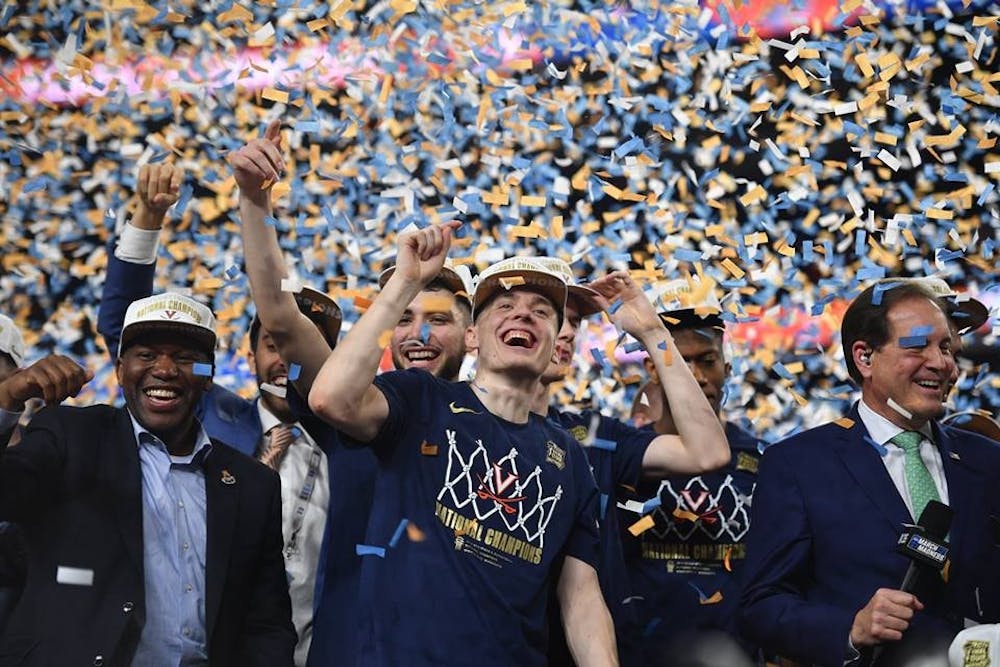In the 2019 NCAA Tournament, the Virginia Cavaliers were the comeback kings. Virginia did not win its first national championship in program history with ease — it took tremendous resilience, which made it all the more spectacular.
The Cavaliers’ comebacks started in the first game of the tournament.
No. 1 seed Virginia was under immense pressure in its first round game against No. 16 seed Gardner-Webb, with seemingly all the fans in the arena pulling for the Runnin’ Bulldogs. A year after the UMBC loss, the mental burden of defeat was still there for the Cavaliers. Red-hot three-point shooting from Gardner-Webb had Virginia down by 14 points at one point in the first half. Cavaliers fans everywhere worried that it was going to happen again — Virginia was going to lose for the second consecutive year to a No. 16 seed. But it didn’t happen. Virginia ended the first half on a 16-8 run to go into the half down by just six points, went ahead early in the second half and never looked back. The Cavaliers went on to win the game 71-56 and, perhaps more importantly, overcame the mental barrier of the defeat last year. Comeback number one was complete.
The Cavaliers didn’t need dramatic comebacks in their next two games, advancing to the Elite Eight behind their trademark — good defense. Virginia handled No. 9 seed Oklahoma in the second round, holding a team that scored 95 points in the first round to just 51 points. In the Sweet Sixteen, Virginia held No. 12 seed Oregon under 50 points. Despite not needing a major comeback, the Cavaliers still trailed with less than six minutes remaining in the game and needed good play down the stretch to win.
Needing only one win to advance to the program’s first Final Four appearance since 1984, Virginia was set for a matchup with No. 3 seed Purdue. The Cavaliers would need a late comeback to make history happen.
In a back-and-forth game, Purdue junior guard Carsen Edwards and Virginia junior guard Kyle Guy traded blows from the three-point line. Edwards seemed almost unstoppable, with 42 points, including 10 three pointers. Guy was able to counteract that somewhat with 25 points of his own, but it was Edwards who made the go-ahead three pointer with 1:11 to go. After Virginia missed an opportunity to respond on the next possession, Purdue went up three points and fouled junior guard Ty Jerome with five seconds remaining. The foul put the Cavaliers in a difficult place, needing three points to tie but only having the opportunity for two. Then the miracle happened. Jerome made the first free throw, missed the second and junior forward Mamadi Diakite tipped the ball into the backcourt. Freshman guard Kihei Clark picked it up and made a gutsy crosscourt pass to Diakite, who made the game-tying basket just as the buzzer sounded. The Cavaliers went on to win the game in overtime, completing comeback number two to give Coach Tony Bennett his first-ever Final Four appearance.
The Final Four was uncharted territory for Virginia. The Cavaliers stepped up on the game’s biggest stage, but it wasn’t without more late-game drama.
Against No. 5 seed Auburn, the Cavaliers were down by three points at the half but broke out to a 10-point lead late in the second half behind stellar play from Jerome. After Jerome went out of the game with four fouls, however, Auburn stormed back and took the lead. The Tigers were up four points, 61-57, with just 17 seconds left.
Then, Guy stepped up. He sank a corner three to cut the Tigers’ lead to one point, and after Auburn junior guard Jared Harper made one of two free throws, Guy made three free throws to send the Cavaliers to victory.
All controversy in the game’s final moments aside, Guy had to deliver clutch baskets to complete comeback number three. The resilience he showed in sinking all three free throws is a testament to his mental toughness.
In the national championship, Virginia squared off against No. 3 seed Texas Tech. Just like the past three games, it was a back-and-forth contest that went down to the wire. After squandering another late-game lead, the Cavaliers found themselves down three points with less than 20 seconds left. This time, it was sophomore guard De’Andre Hunter who provided the magic. He drained a corner three to tie the game, and the Cavaliers hung on to send it to overtime. In the overtime period, Virginia took the lead on a three from Hunter and dominated the rest of the way to win 85-77. Comeback number four was complete, and Virginia won the first national championship in program history.
The joy of victory means more in the context of the difficulty of last year’s defeat. This tournament run has been the biggest comeback of all. Embarrassment has turned to pride. Devastation has turned to celebration. The worst loss in program history turned into the best win in program history.
The scenes of jubilation in the streets of Charlottesville Monday night are memories Virginia students will cherish forever. The comeback is complete.







